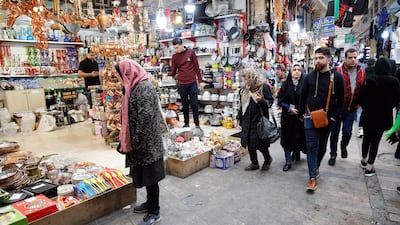Cracks have appeared in Iran’s efforts to remove Europe from the US policy to restore sanctions against Tehran as a senior foreign ministry official publicly complained of a “lack of speed” in efforts to save its oil trade.
After a second phase of US sanctions came into force on Monday, Iran has become increasing reliant on the EU to sustain trade liberalised under the 2015 Joint Comprehensive Plan of Action that removed UN sanctions in return for nuclear concessions.
Iranian Deputy Foreign Minister Seyed Kazem Sajjadpour revealed that Tehran placed its hopes in a belief that European “appeasement” of the administration of President Donald Trump had ended.
But Europe’s proposed solution through a special purpose vehicle clearing accounts that would allow trade with Iran to continue protected from the threat of US sanctions had flaws, amounting to “an interesting procedure”, not a workable solution.
Mr Sajjadpour is a foreign ministry veteran who runs the inhouse think tank that provides advice and support to the Iranian leadership and plays a key role in evaluating bilateral relationships.
“What is lacking is speed and efficiency," he said. “What we need is quickness and a process that is results-oriented. They should be more active in implementing it. It is about results.”
He said that the Europeans thought it was sufficient to keep small and medium-sized businesses active in Iran "without making any noise".
Tehran was putting its hopes in eastern trade to sustain oil revenues as the US granted waivers to non-European countries to buy Iranian crude.
“Iran is looking to Russia, China as alternatives to the US and a slow-moving Europe,” Mr Sajjadpour said. “In fact we have to look at a diversity of interactions, not just Russia and Asia but other pivots too. Power is shifting globally.”
At a meeting in London’s Chatham House, Mr Sajjadpour was repeatedly challenged over Iran’s resilience to the US, saying that Iranian politics was independent from international pressure and thus, when “Washington coughs we don’t get a cold”.
Nonetheless, he described the American approach as putting a knife to Iran’s throat and then demanding talks, and indicated that the Iranian leadership prioritised its fear of regime change over the prospect of the collapse of the economy.
"The assumption is, we cut the money from the oil, then Iran will be deprived, then Iranian people will revolt, then the system will be changed, then we are fine, then the paradise will come," he said.
______________
Read more:
US says it stands with Iranians as sanctions hit Tehran
Iran: markets on hold as US sanctions take effect
US turns the screws on Iran as full sanctions take effect
______________
The EU bid to cushion Iran’s oil sales has faltered despite the November 4 deadline being known for weeks. It had hoped to launch the special vehicle by the time of the sanctions announcement but no EU country has volunteered to host it.
Several states have stalled on a request from EU foreign policy chief Federica Mogherini to consider hosting the vehicle. Part of the reluctance lies in anger over a campaign of targeted assassinations carried out by Iranian agents, overseen by its European diplomatic network.
Among the eight nations granted waivers by the US to continue placing orders for Iranian energy is Turkey but despite the concessions the country's president on Tuesday criticised the resumption of sanctions.
Condemning a “destabilising step”, President Recep Tayyip Erdogan said the sanctions contravene international law.
"We do not find sanctions to be right because to us, they are sanctions aimed at upsetting the global balance," Mr Erdogan said.
With an economic crisis of its own, Turkey is desperate to avoid a crippling winter fuel crunch. The Washington concession was made on the basis that Turkey should establish a roadmap to wean off Iranians so that it is ready when the temporary waiver is lifted.
Mr Erdogan however stressed that he could not allow his citizens to "freeze in winter".
"We cannot abide by them (the sanctions), we cannot accept them," he said.


